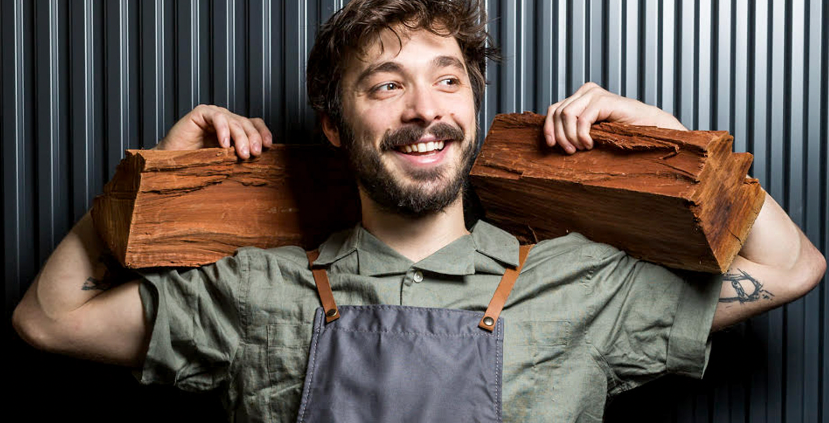
Living off the fat of the land is an idiom first coined in the bible. The meaning is to be wealthy or to live well, without having to work hard. Prado Restaurant, now with a reputation for being one of the best restaurants in Lisbon, disrupts this idea by embodying the more literal sense of the idiom. Here guests can eat like Kings and Queens in a modest setting; sampling fine and humble, ingredients in a trailblazer for Portugal’s growing gastronomical achievements. Expect to eat plenty of fat of the land.
Surprisingly this is the first lone venture of Lisbon’s most recent culinary icon, Chef António Galapito. He learnt his craft in London and remained in the capital for seven years, whilst honing his skills under the lauded chef Nuno Mendes, responsible for the food at the stratospherically popular Chiltern Firehouse, amongst others. In fact, Galapito had no intention of moving back to his home country, let alone establishing his own restaurant. That was until a venue was offered to him.

Prado Lisbon is housed in a former fish factory on the edge of the higgledy-piggledy old town of Lisbon, near the Sé, the city’s iconic cathedral. There is no escaping the unfussiness of the venue. The room is a large and airy atrium with a polished concrete floor filled with simple, scandi-style pine tables and chairs. Black corrugated iron covers the bar and kitchen walls and is opposed by dusty blue wooden panelling in the seating area. This creates a more congenial comfort amongst the severe materials and helps to fill in the tall, cream walls. Disused fish canning machinery wrapped in greenery is suspended from the industrially high ceilings as well as numerous pendants with filament bulbs. The bizarre positioning of these ‘upside down plants’ not only remind António Galapito of the overgrown weeds and ivy which dominated the inside of this abandoned building as he found it, but it also brings a hygge-worthy softness to the décor. Prado after all is Portuguese for meadow.

Guests will quickly learn that pork fat is Galapito’s favourite ingredient at Prado Restaurant. A primal offering of warm sourdough with whipped pork fat, garlic and paprika, instead of butter, is the first and obvious clue. If you are gluten free, the homemade crackers with seeds are crisp, light and salty and as good as its wheaten counterpart. The second clues are in the playful amuse bouches of smoky quail’s egg with cured belly and sardines on toast with lardo – a translucent strip of pork fat, perfectly balanced with a subtle tartness of the vinegar marinade. The beef tartare with shitake wrapped in grilled Galician cabbage is a robust and earthy mouthful which is a favourite amongst diners.

Another clue is in the making of Azores squid, potato and ham butter. At first instance, this appears like a hearty pasta dish, but a mouthful reveals that the pasta is in fact thin strips of squid bathing in a rich buttery sauce. Here, potatoes are in the unusual role of the flavour-giver and a rocket garnish offers a peppery relief. The Acorn fed Alentejano pork with turnip tops is a complete and tasty dish. The slightly pink pork is succulent with a nutty flavour and turnip tops adding a freshness you wish you could enjoy more often. For a lighter alternative, the seared tuna belly in a tomato consommé is a mellifluous mixture of potent, citrusy aromas thanks to the purslane, mustard leaves and spring onion oil. The tuna, as dark as aged beef, swims in a consommé that is deceptively richer and sweeter than ripe tomatoes despite being as clear as water.

The stalwart vegetarian option which remains an overarching favourite is the oyster mushrooms in massa pimentao and buckwheat. In another trompe l’oeil, the chunky oyster mushrooms could be mistaken for something non-vegetarian in texture, but the buttery, umami flavour that prevails is distinctively mushroom. The richness of flavour is offset by a palpable but welcomed bitterness from the peppers which smother the dish in a purée form. The crunchy toasted buckwheat rounds off a dish so popular that despite Galapito craving change, it has been too high in demand to remove it from the menu. For something sweet, there is mushroom ice cream for the adventurous, where nutty, caramel and barley flavours all merge perfectly without question; or the pineapple with kaffir lime oil and smoked bee pollen to end the meal in a lighter way.
Antonio Galapito has his own ecosystem of suppliers and staff, all held close to him and Prado Lisbon is proud to have a very low turnover of staff and suppliers. Galapito has carefully handpicked and visited every single supplier of his raw ingredients, to the point that he can recount the name of the towns and sizes of farms of his meat producers. It is this special and personal touch that fuels the success of Prado in a global movement to become more sustainable. On the back of the menu is an extensive list of the restaurant’s main suppliers just in case anyone thought of taking them to task on their mantra: ‘if it’s not in season, it’s not on the menu’.

A word of advice for your first time at Prado Lisbon: do not be afraid to order the wine off-menu. The astute sommelier brings in small batches of wine on a regular basis to trial and these ‘limited editions’ maintain a fresh and exciting offering for wine lovers. The majority of wines are from Portugal, where the conditions are ideal for biodynamic cultivation, and everything on the menu is at a minimum sustainably produced, but often organic or biodynamic. For something non-alcoholic, their homemade lemonade with fig leaf is refreshingly savoury and aromatic.
Despite the outpouring of pride in his creations, Antonio Galapito is ego-less; an embodied extension of the humble ingredients he uses in his displays of alchemy. A rare trait in a chef of his talent at the helm of the best restaurant in Lisbon. Talent, which has caught the attention of the seven Michelin-starred chef Thomas Keller who came immediately after his plane touched down in Lisbon in order to squeeze in dinner at Prado, on a recent visit to Portugal. Prado is the product of the one man’s honouring of the environment, his country and its ingredients with the help of his exceptional palette; illustrating how one can live well off the fat of the land, per se.

